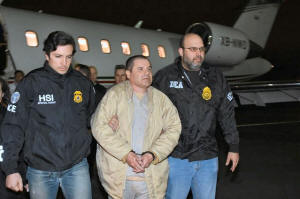|
'El Chapo' prison conditions worst in
U.S., prevent proper defense: lawyers
 Send a link to a friend
Send a link to a friend
 [March 31, 2017]
By Frank Jack Daniel and Mica Rosenberg [March 31, 2017]
By Frank Jack Daniel and Mica Rosenberg
(Reuters) - Held without access to sunlight
or his relatives, Mexican drug lord Joaquin "El Chapo" Guzman is under
more restrictive captivity than any other U.S. prisoner and it is
difficult to mount a defense, his court-appointed lawyers said on
Thursday.
Mexico extradited Guzman, who is the head of Sinaloa Cartel, to New York
in January, a few hours before U.S. President Donald Trump took office.
Guzman, who escaped from two Mexican prisons and was a key figure in a
bloody drug war, is seen as a flight risk by the U.S. government.
Guzman is restricted to his New York City cell for 23 hours a day, with
the lights on at all times. He has one hour of exercise in a small
interior cage with no access to fresh air or sunlight, Amnesty
International said in a letter to Assistant U.S. Attorney Andrea
Goldbarg dated March 28.
Saying that Guzman's captivity appeared to be "unnecessarily harsh" and
in contravention of minimum U.N. standards for the treatment of
prisoners, the human rights group has requested access to his cell to
verify the conditions.

"We will continue to investigate cases of alleged improper treatment of
prisoners, regardless of who the prisoner is or what they may have
done," Amnesty International's Americas Director Erika Guevera-Rosas
said in a statement.
Guzman, who sold oranges as a child before turning to the drug trade in
the 1970s, has not been allowed to speak to his wife or other family
members. The conditions of captivity exceed any other mainland U.S.
prison, including the super-secure Colorado prison known as Supermax,
public defense attorney Michelle Gelernt said.
"Mr. Guzman is being held under the worst, most restrictive conditions
of any prisoner currently detained by the United States government,"
Gelernt said."Even convicted prisoners held in the notorious federal
Supermax in Colorado are allowed to watch television in their cells,
exercise outside where they can speak with other inmates, and speak with
their families. Mr. Guzman enjoys none of these benefits."
[to top of second column] |

Mexico's top drug lord Joaquin "El Chapo" Guzman is escorted as he
arrives at Long Island MacArthur airport in New York, U.S., January
19, 2017, after his extradition from Mexico. U.S. officials/Handout
via REUTERS

The U.S. confinement conditions, especially restrictions on
communicating with family members, mean it is tough for Guzman to
contact private lawyers because he is not able to speak to his
family to arrange payment or discuss potential attorneys, Gelernt
said.
"The need to continually seek relief from the draconian jail
conditions will distract Mr. Guzman and his lawyers from defending
against the charges," she said.
In a filing on Wednesday to U.S. District Judge Brian Cogan of the
Eastern District of New York, Guzman's lawyers said the strict
confinement puts Guzman at risk of psychological damage, and that he
may already be "hearing non-existent sounds."
U.S. prosecutors have argued that such tough measures - called
Special Administrative Measures - are needed to prevent Guzman from
communicating with his cartel cohorts still running the
multinational trafficking organization, and to prevent repeats of
his two Mexican prison escapes.
In his most recent escape in 2015, Guzman walked out of prison
through a mile-long highly engineered tunnel from his cell, a sign
of the huge influence he was able to wield even from behind bars.
(Editing by Dan Grebler and Paul Tait)
[© 2017 Thomson Reuters. All rights
reserved.]
Copyright 2017 Reuters. All rights reserved. This material may not be published,
broadcast, rewritten or redistributed.

 |